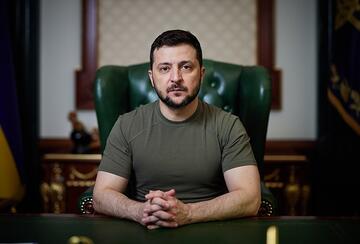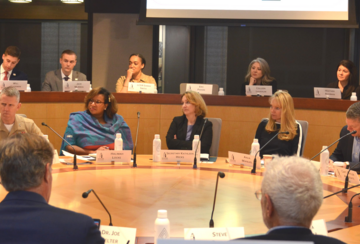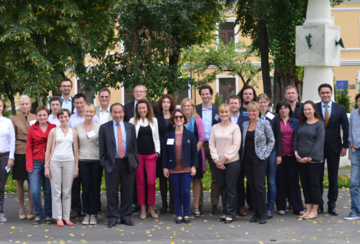News

The Korea Program at Stanford’s Walter H. Shorenstein Asia-Pacific Research Center will commemorate its 20-year anniversary with a two-day conference, convening eminent speakers from the K-pop industry, academia, and government, and unveiling two new documentary films.

The invasion of Ukraine is offering useful lessons for the PLA.

As alumni of the Ford Dorsey Master's in International Policy at the Freeman Spogli Institute for International Studies, Angela Ortega Pastor and Hallie Lucas continue their efforts to bring clean, affordable energy to businesses in Mexico.

While Ukrainians fight or flee Russia’s bombardment of their cities, many Europeans feel a palpable, renewed nuclear fear.

Magen, a scholar of law, government and international relations, will arrive at Stanford in the 2022-2023 academic year.

Predoctoral Fellow Spotlight: Tongtong Zhang Examines Channels for Public Deliberation in China
Political Scientist and APARC Predoctoral Fellow Tongtong Zhang explores how the Chinese Communist Party maintains control through various forms of political communication.

What is Ukraine’s best security guarantee?
What is Ukraine’s best security guarantee?
Russia’s unprovoked and unjustified war on Ukraine has run nearly seven weeks.

A visit from the Department of Defense’s deputy secretary gave the Gordian Knot Center a prime opportunity to showcase how its faculty and students are working to build an innovative workforce that can help solve the nation’s most pressing national security challenges.

Russia's ongoing war in Ukraine demonstrates that hypothetical scenarios of cyberattacks paralyzing satellite communications are already taking place.

In the first study to compare the progression of educational disparities in disability across two rapidly aging Asian societies, APARC coauthors Cynthia Chen and Karen Eggleston project that from 2015 to 2050, elders with high educational attainment will have a lower prevalence of functional disability and chronic conditions compared to elderly with low educational attainment.

The Program on Arab Reform and Democracy (ARD) at CDDRL, in partnership with the Arab Studies Institute, is pleased to announce the release of the fifth episode of Mofeed-19, a 19-minute video podcast that discusses research efforts pertaining to the impact of the COVID-19 pandemic on the Arab world.

What is genocide? Did the Soviet Holodomor (man-made famine) in 1930s Ukraine fit this definition? Do the recent atrocities in Bucha? Has the Russian military conducted itself in a similar manner in prior conflicts? Is there a pattern there? Find out as Sean Patrick Hazlett meets with Stanford Professor Dr. Norman Naimark.

Speaking at the April 2022 meeting of the FSI Council, Larry Diamond offered his assessment of the present dangers to global democracy and the need to take decisive action in support of liberal values.
News, highlights, publications, events and opportunities from our programs and scholars

Nearly 70% of Americans surveyed by the American Psychological Association said they worry the invasion of Ukraine could potentially lead to nuclear war and they fear that we could be at the beginning stages of World War III.
Amy Zegart on the Capabilities of American Intel Gathering
Political scientists Aidan Milliff and Jingkai He will join APARC as Shorenstein postdoctoral fellows on contemporary Asia, and economist Jianan Yang will join as our Asia Health Policy postdoctoral fellow for the 2022-23 academic year.
In the largest cohort study of its kind, research led by SHP's David Studdert and Yifan Zhang shows that people living with handgun owners are significantly more likely to die by homicide compared with neighbors in gun-free homes.

Since 2005, the Freeman Spogli Institute for International Studies has cultivated rich academic ties and friendships with Ukrainian scholars and civic leaders as part of our mission to support democracy and development domestically and abroad.

Ethnographer and APARC Postdoctoral Fellow Mary-Collier Wilks unveils how distinct development narratives shape the dynamics of aid chains and international organizations’ delivery of services in Southeast Asia.
Our recent Health Equity Lecture was given Dr. Utibe Essien, who is on a mission to ensure patients — regardless of race, ethnicity or socioeconomic status — have access to the highest-quality medications on the market.

At an in-person meeting of a joint delegation from Japan's Embassy to the United States and Consulate-General of Japan in San Francisco with a panel of experts from Stanford and UC Berkeley, Japanese Ambassador Koji Tomita stressed the importance of bilateral academic collaboration in the continual development of the U.S.-Japan partnership.




![[Left to right]: Michael McFaul, Marshall Burke, Steven Pifer, Oriana Skylar Mastro, Didi Kuo, and Amichai Magen on stage.](https://fsi9-prod.s3.us-west-1.amazonaws.com/s3fs-public/styles/480x270/public/2024-10/fsi_reunion_2024_panel_hero.png?h=c4d9845d&itok=s9RgEIqP)




